LST5CCL Company Law S1 2018: Consumer Guarantees & Liabilities
VerifiedAdded on 2023/06/12
|8
|1488
|440
Case Study
AI Summary
This case study delves into issues arising from a listeria outbreak linked to melons sold by R’Us, focusing on consumer rights and manufacturer liabilities under Australian Company Law. Jocelyn, a consumer, suffers consequential loss due to consuming contaminated melons, leading to questions of compensation for medical bills and childcare. Arjun, another consumer, falls ill from the same melons, raising concerns about product safety defects and R’Us's liability as the manufacturer under the Australian Consumer Law (ACL). The analysis extends to potential tort of negligence and breach of implied contract, highlighting the duty of care manufacturers owe to consumers. The document references key cases and sections of the ACL to support its arguments, providing a comprehensive overview of the legal implications for R’Us and the rights of the affected consumers. Desklib offers similar solved assignments and past papers for students.
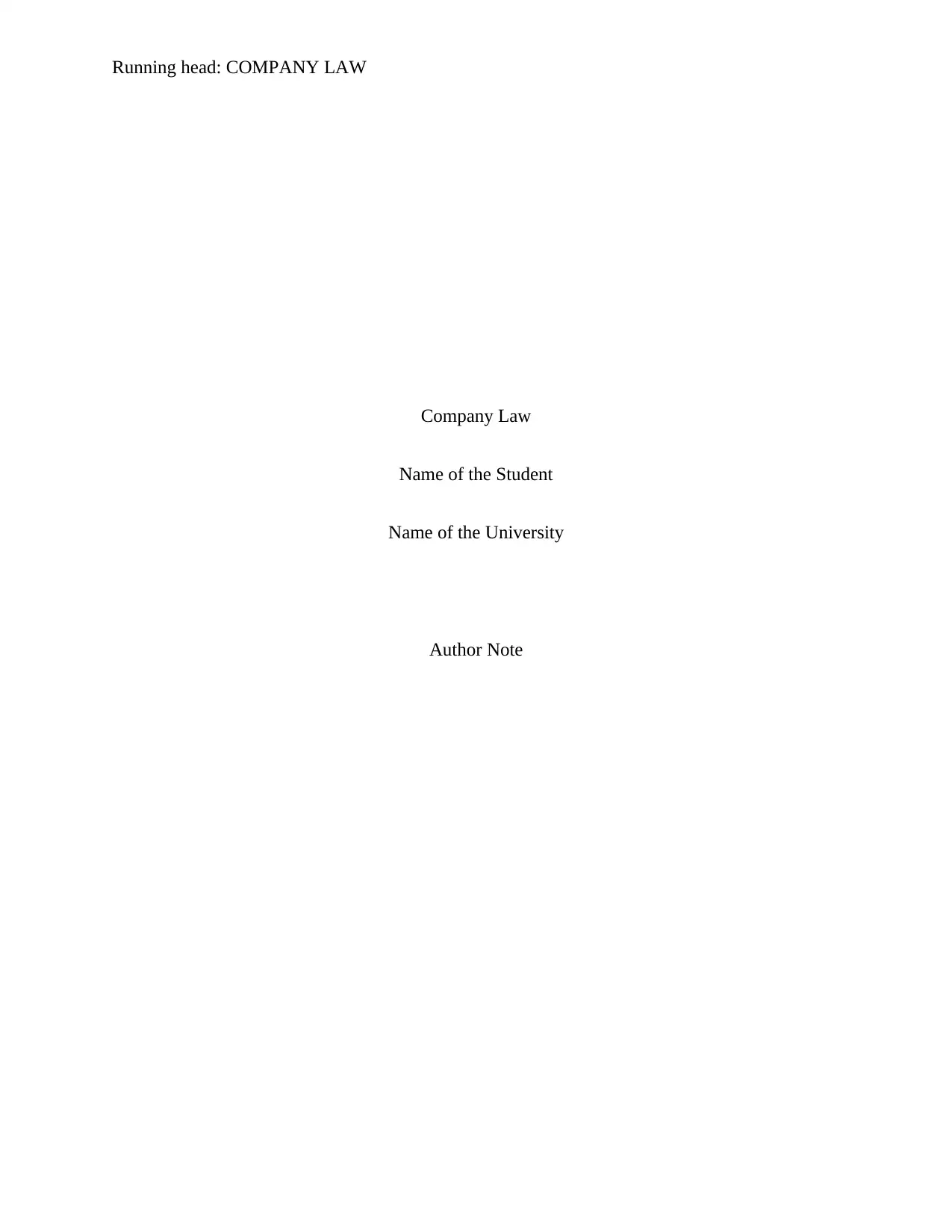
Running head: COMPANY LAW
Company Law
Name of the Student
Name of the University
Author Note
Company Law
Name of the Student
Name of the University
Author Note
Paraphrase This Document
Need a fresh take? Get an instant paraphrase of this document with our AI Paraphraser
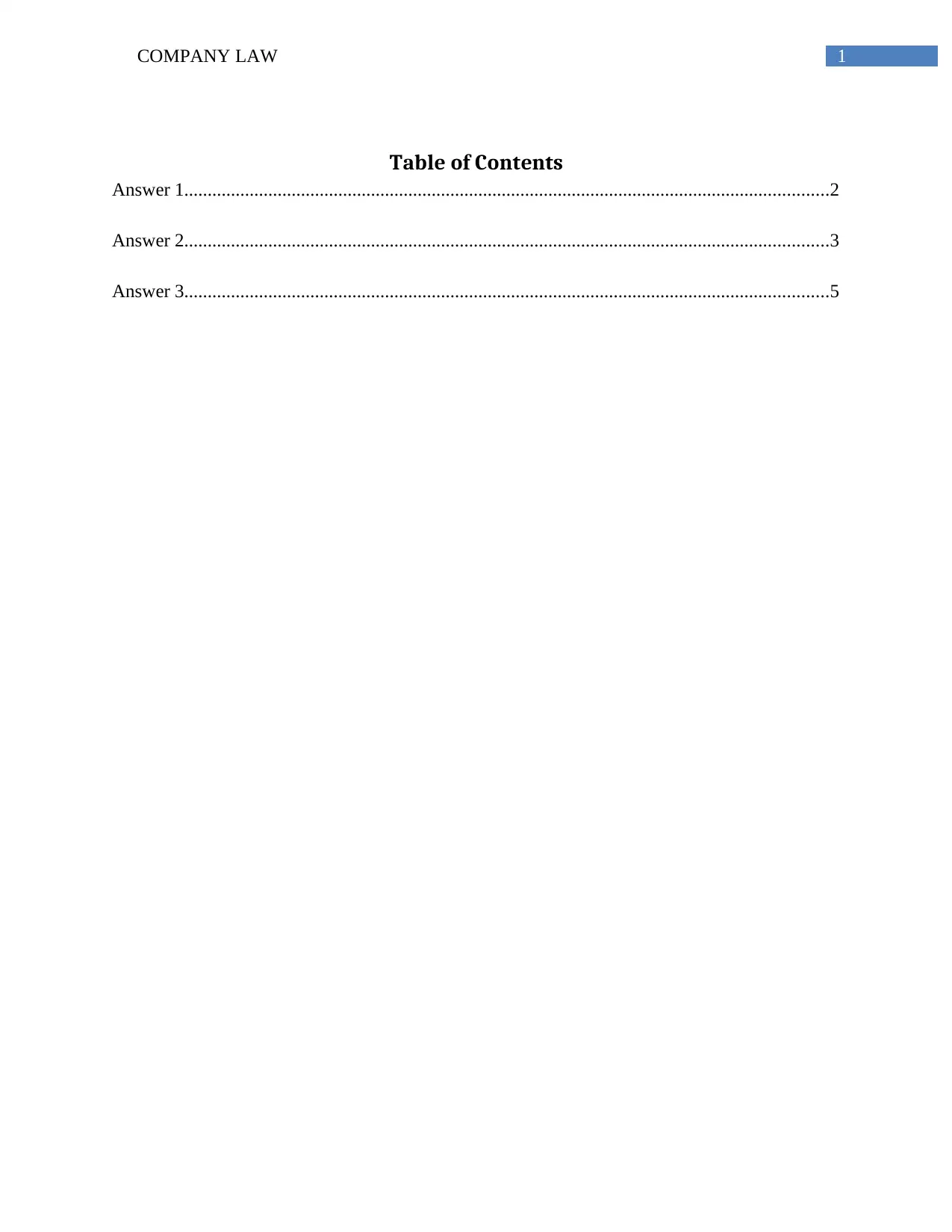
1COMPANY LAW
Table of Contents
Answer 1..........................................................................................................................................2
Answer 2..........................................................................................................................................3
Answer 3..........................................................................................................................................5
Table of Contents
Answer 1..........................................................................................................................................2
Answer 2..........................................................................................................................................3
Answer 3..........................................................................................................................................5
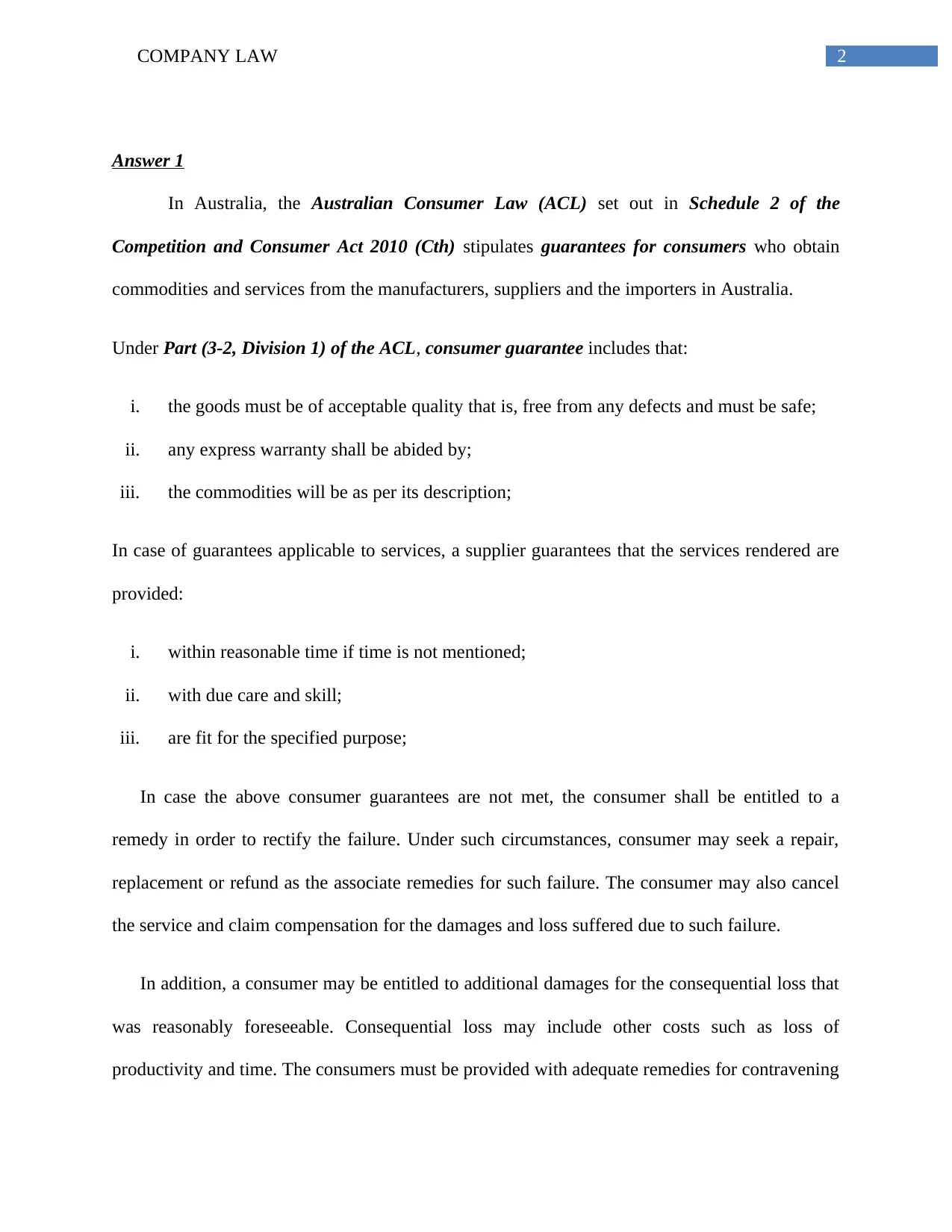
2COMPANY LAW
Answer 1
In Australia, the Australian Consumer Law (ACL) set out in Schedule 2 of the
Competition and Consumer Act 2010 (Cth) stipulates guarantees for consumers who obtain
commodities and services from the manufacturers, suppliers and the importers in Australia.
Under Part (3-2, Division 1) of the ACL, consumer guarantee includes that:
i. the goods must be of acceptable quality that is, free from any defects and must be safe;
ii. any express warranty shall be abided by;
iii. the commodities will be as per its description;
In case of guarantees applicable to services, a supplier guarantees that the services rendered are
provided:
i. within reasonable time if time is not mentioned;
ii. with due care and skill;
iii. are fit for the specified purpose;
In case the above consumer guarantees are not met, the consumer shall be entitled to a
remedy in order to rectify the failure. Under such circumstances, consumer may seek a repair,
replacement or refund as the associate remedies for such failure. The consumer may also cancel
the service and claim compensation for the damages and loss suffered due to such failure.
In addition, a consumer may be entitled to additional damages for the consequential loss that
was reasonably foreseeable. Consequential loss may include other costs such as loss of
productivity and time. The consumers must be provided with adequate remedies for contravening
Answer 1
In Australia, the Australian Consumer Law (ACL) set out in Schedule 2 of the
Competition and Consumer Act 2010 (Cth) stipulates guarantees for consumers who obtain
commodities and services from the manufacturers, suppliers and the importers in Australia.
Under Part (3-2, Division 1) of the ACL, consumer guarantee includes that:
i. the goods must be of acceptable quality that is, free from any defects and must be safe;
ii. any express warranty shall be abided by;
iii. the commodities will be as per its description;
In case of guarantees applicable to services, a supplier guarantees that the services rendered are
provided:
i. within reasonable time if time is not mentioned;
ii. with due care and skill;
iii. are fit for the specified purpose;
In case the above consumer guarantees are not met, the consumer shall be entitled to a
remedy in order to rectify the failure. Under such circumstances, consumer may seek a repair,
replacement or refund as the associate remedies for such failure. The consumer may also cancel
the service and claim compensation for the damages and loss suffered due to such failure.
In addition, a consumer may be entitled to additional damages for the consequential loss that
was reasonably foreseeable. Consequential loss may include other costs such as loss of
productivity and time. The consumers must be provided with adequate remedies for contravening
⊘ This is a preview!⊘
Do you want full access?
Subscribe today to unlock all pages.

Trusted by 1+ million students worldwide
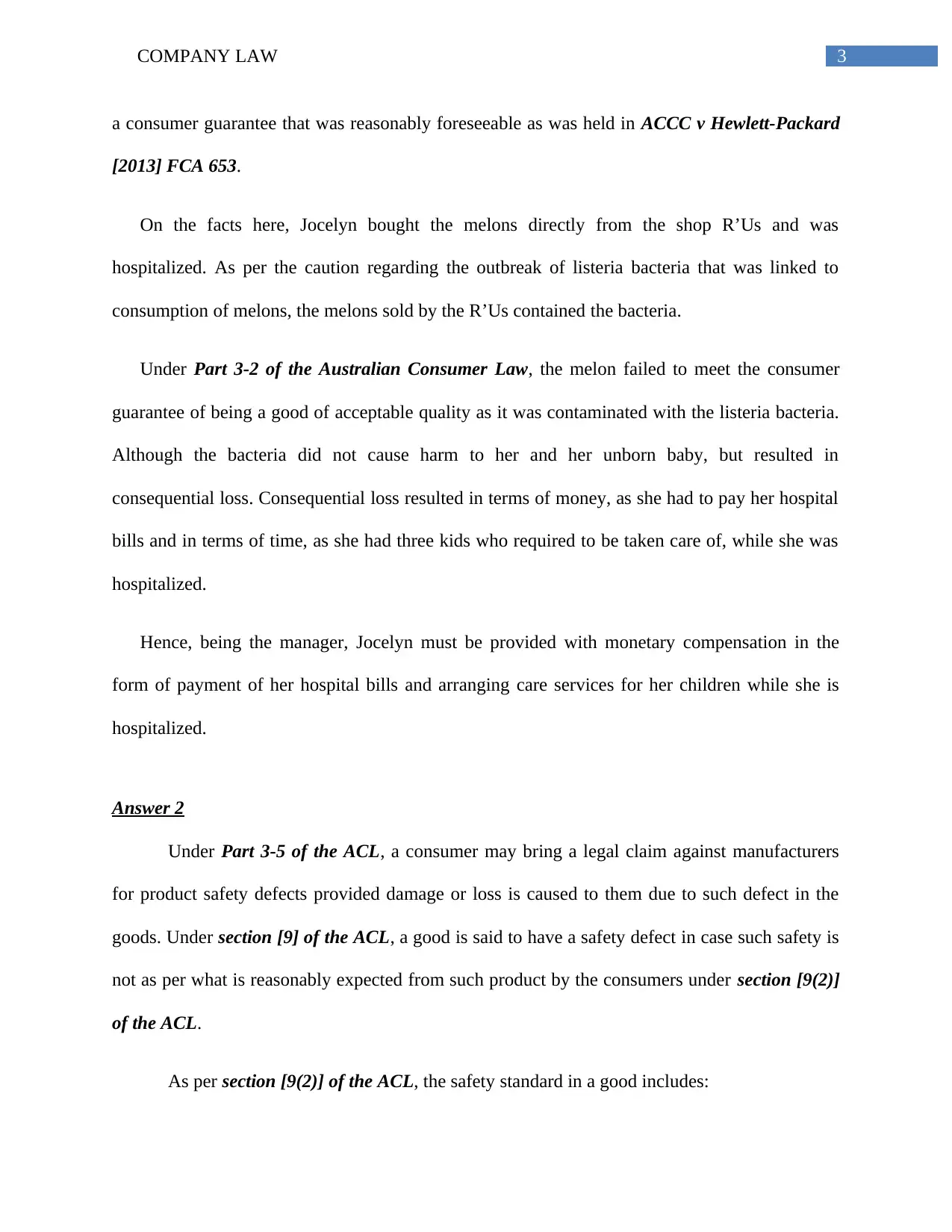
3COMPANY LAW
a consumer guarantee that was reasonably foreseeable as was held in ACCC v Hewlett-Packard
[2013] FCA 653.
On the facts here, Jocelyn bought the melons directly from the shop R’Us and was
hospitalized. As per the caution regarding the outbreak of listeria bacteria that was linked to
consumption of melons, the melons sold by the R’Us contained the bacteria.
Under Part 3-2 of the Australian Consumer Law, the melon failed to meet the consumer
guarantee of being a good of acceptable quality as it was contaminated with the listeria bacteria.
Although the bacteria did not cause harm to her and her unborn baby, but resulted in
consequential loss. Consequential loss resulted in terms of money, as she had to pay her hospital
bills and in terms of time, as she had three kids who required to be taken care of, while she was
hospitalized.
Hence, being the manager, Jocelyn must be provided with monetary compensation in the
form of payment of her hospital bills and arranging care services for her children while she is
hospitalized.
Answer 2
Under Part 3-5 of the ACL, a consumer may bring a legal claim against manufacturers
for product safety defects provided damage or loss is caused to them due to such defect in the
goods. Under section [9] of the ACL, a good is said to have a safety defect in case such safety is
not as per what is reasonably expected from such product by the consumers under section [9(2)]
of the ACL.
As per section [9(2)] of the ACL, the safety standard in a good includes:
a consumer guarantee that was reasonably foreseeable as was held in ACCC v Hewlett-Packard
[2013] FCA 653.
On the facts here, Jocelyn bought the melons directly from the shop R’Us and was
hospitalized. As per the caution regarding the outbreak of listeria bacteria that was linked to
consumption of melons, the melons sold by the R’Us contained the bacteria.
Under Part 3-2 of the Australian Consumer Law, the melon failed to meet the consumer
guarantee of being a good of acceptable quality as it was contaminated with the listeria bacteria.
Although the bacteria did not cause harm to her and her unborn baby, but resulted in
consequential loss. Consequential loss resulted in terms of money, as she had to pay her hospital
bills and in terms of time, as she had three kids who required to be taken care of, while she was
hospitalized.
Hence, being the manager, Jocelyn must be provided with monetary compensation in the
form of payment of her hospital bills and arranging care services for her children while she is
hospitalized.
Answer 2
Under Part 3-5 of the ACL, a consumer may bring a legal claim against manufacturers
for product safety defects provided damage or loss is caused to them due to such defect in the
goods. Under section [9] of the ACL, a good is said to have a safety defect in case such safety is
not as per what is reasonably expected from such product by the consumers under section [9(2)]
of the ACL.
As per section [9(2)] of the ACL, the safety standard in a good includes:
Paraphrase This Document
Need a fresh take? Get an instant paraphrase of this document with our AI Paraphraser
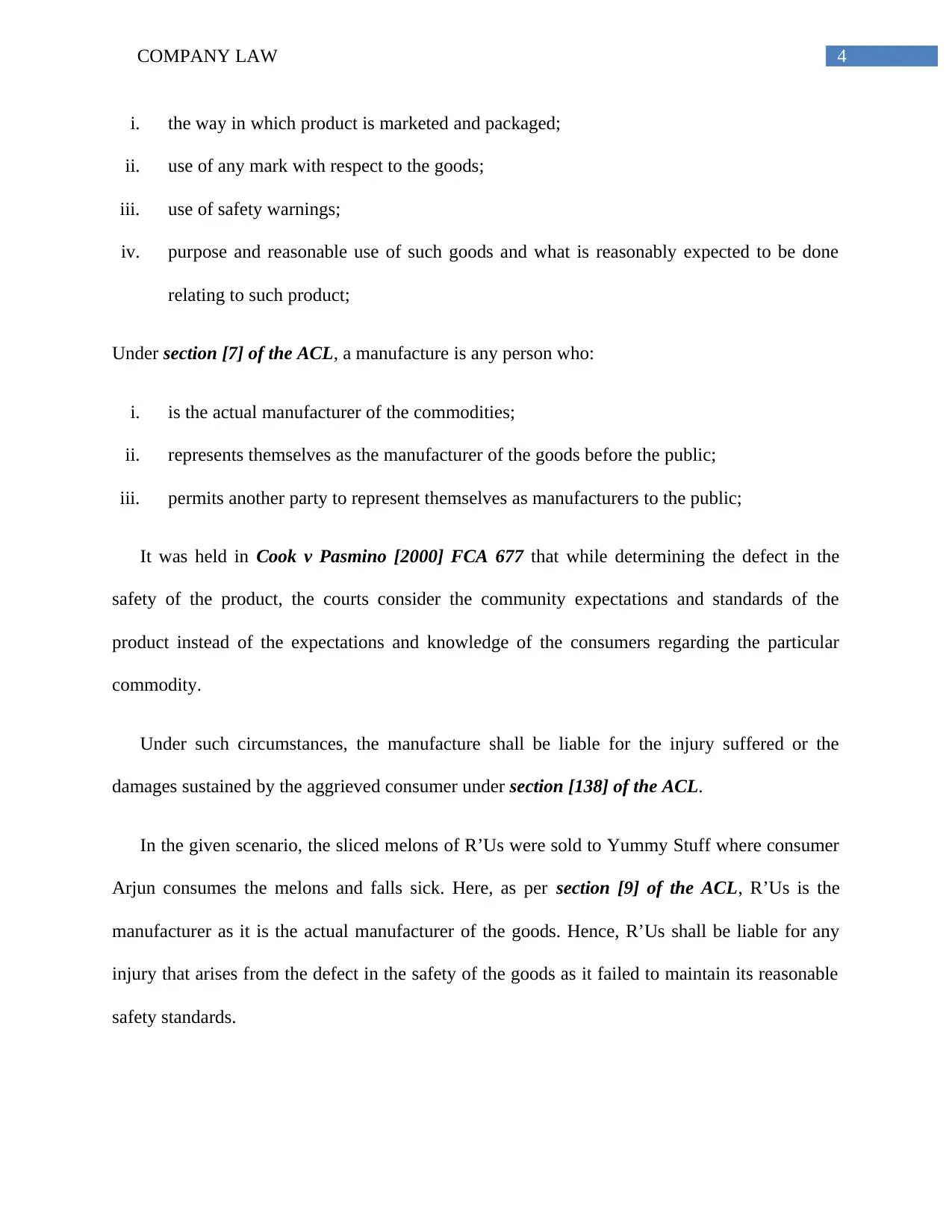
4COMPANY LAW
i. the way in which product is marketed and packaged;
ii. use of any mark with respect to the goods;
iii. use of safety warnings;
iv. purpose and reasonable use of such goods and what is reasonably expected to be done
relating to such product;
Under section [7] of the ACL, a manufacture is any person who:
i. is the actual manufacturer of the commodities;
ii. represents themselves as the manufacturer of the goods before the public;
iii. permits another party to represent themselves as manufacturers to the public;
It was held in Cook v Pasmino [2000] FCA 677 that while determining the defect in the
safety of the product, the courts consider the community expectations and standards of the
product instead of the expectations and knowledge of the consumers regarding the particular
commodity.
Under such circumstances, the manufacture shall be liable for the injury suffered or the
damages sustained by the aggrieved consumer under section [138] of the ACL.
In the given scenario, the sliced melons of R’Us were sold to Yummy Stuff where consumer
Arjun consumes the melons and falls sick. Here, as per section [9] of the ACL, R’Us is the
manufacturer as it is the actual manufacturer of the goods. Hence, R’Us shall be liable for any
injury that arises from the defect in the safety of the goods as it failed to maintain its reasonable
safety standards.
i. the way in which product is marketed and packaged;
ii. use of any mark with respect to the goods;
iii. use of safety warnings;
iv. purpose and reasonable use of such goods and what is reasonably expected to be done
relating to such product;
Under section [7] of the ACL, a manufacture is any person who:
i. is the actual manufacturer of the commodities;
ii. represents themselves as the manufacturer of the goods before the public;
iii. permits another party to represent themselves as manufacturers to the public;
It was held in Cook v Pasmino [2000] FCA 677 that while determining the defect in the
safety of the product, the courts consider the community expectations and standards of the
product instead of the expectations and knowledge of the consumers regarding the particular
commodity.
Under such circumstances, the manufacture shall be liable for the injury suffered or the
damages sustained by the aggrieved consumer under section [138] of the ACL.
In the given scenario, the sliced melons of R’Us were sold to Yummy Stuff where consumer
Arjun consumes the melons and falls sick. Here, as per section [9] of the ACL, R’Us is the
manufacturer as it is the actual manufacturer of the goods. Hence, R’Us shall be liable for any
injury that arises from the defect in the safety of the goods as it failed to maintain its reasonable
safety standards.
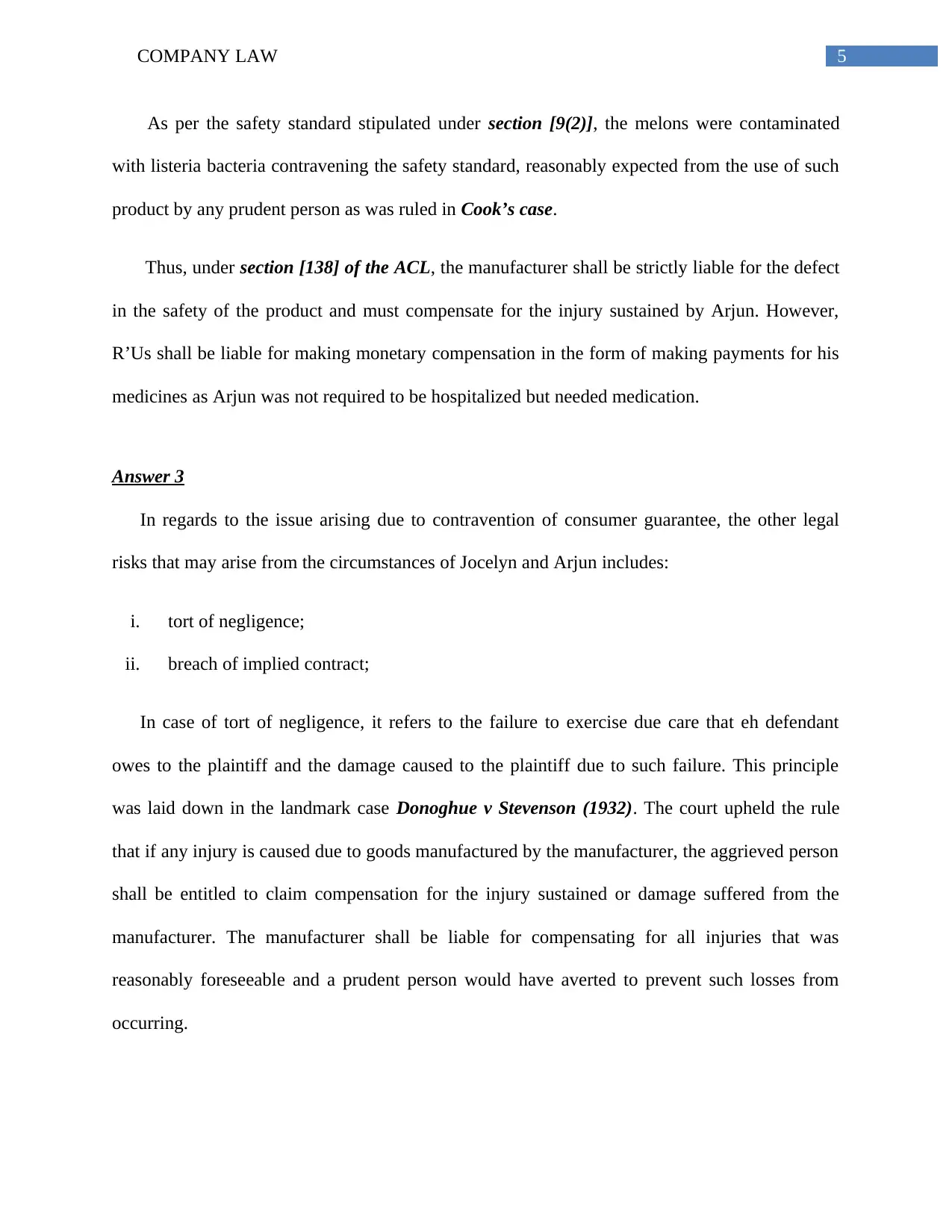
5COMPANY LAW
As per the safety standard stipulated under section [9(2)], the melons were contaminated
with listeria bacteria contravening the safety standard, reasonably expected from the use of such
product by any prudent person as was ruled in Cook’s case.
Thus, under section [138] of the ACL, the manufacturer shall be strictly liable for the defect
in the safety of the product and must compensate for the injury sustained by Arjun. However,
R’Us shall be liable for making monetary compensation in the form of making payments for his
medicines as Arjun was not required to be hospitalized but needed medication.
Answer 3
In regards to the issue arising due to contravention of consumer guarantee, the other legal
risks that may arise from the circumstances of Jocelyn and Arjun includes:
i. tort of negligence;
ii. breach of implied contract;
In case of tort of negligence, it refers to the failure to exercise due care that eh defendant
owes to the plaintiff and the damage caused to the plaintiff due to such failure. This principle
was laid down in the landmark case Donoghue v Stevenson (1932). The court upheld the rule
that if any injury is caused due to goods manufactured by the manufacturer, the aggrieved person
shall be entitled to claim compensation for the injury sustained or damage suffered from the
manufacturer. The manufacturer shall be liable for compensating for all injuries that was
reasonably foreseeable and a prudent person would have averted to prevent such losses from
occurring.
As per the safety standard stipulated under section [9(2)], the melons were contaminated
with listeria bacteria contravening the safety standard, reasonably expected from the use of such
product by any prudent person as was ruled in Cook’s case.
Thus, under section [138] of the ACL, the manufacturer shall be strictly liable for the defect
in the safety of the product and must compensate for the injury sustained by Arjun. However,
R’Us shall be liable for making monetary compensation in the form of making payments for his
medicines as Arjun was not required to be hospitalized but needed medication.
Answer 3
In regards to the issue arising due to contravention of consumer guarantee, the other legal
risks that may arise from the circumstances of Jocelyn and Arjun includes:
i. tort of negligence;
ii. breach of implied contract;
In case of tort of negligence, it refers to the failure to exercise due care that eh defendant
owes to the plaintiff and the damage caused to the plaintiff due to such failure. This principle
was laid down in the landmark case Donoghue v Stevenson (1932). The court upheld the rule
that if any injury is caused due to goods manufactured by the manufacturer, the aggrieved person
shall be entitled to claim compensation for the injury sustained or damage suffered from the
manufacturer. The manufacturer shall be liable for compensating for all injuries that was
reasonably foreseeable and a prudent person would have averted to prevent such losses from
occurring.
⊘ This is a preview!⊘
Do you want full access?
Subscribe today to unlock all pages.

Trusted by 1+ million students worldwide
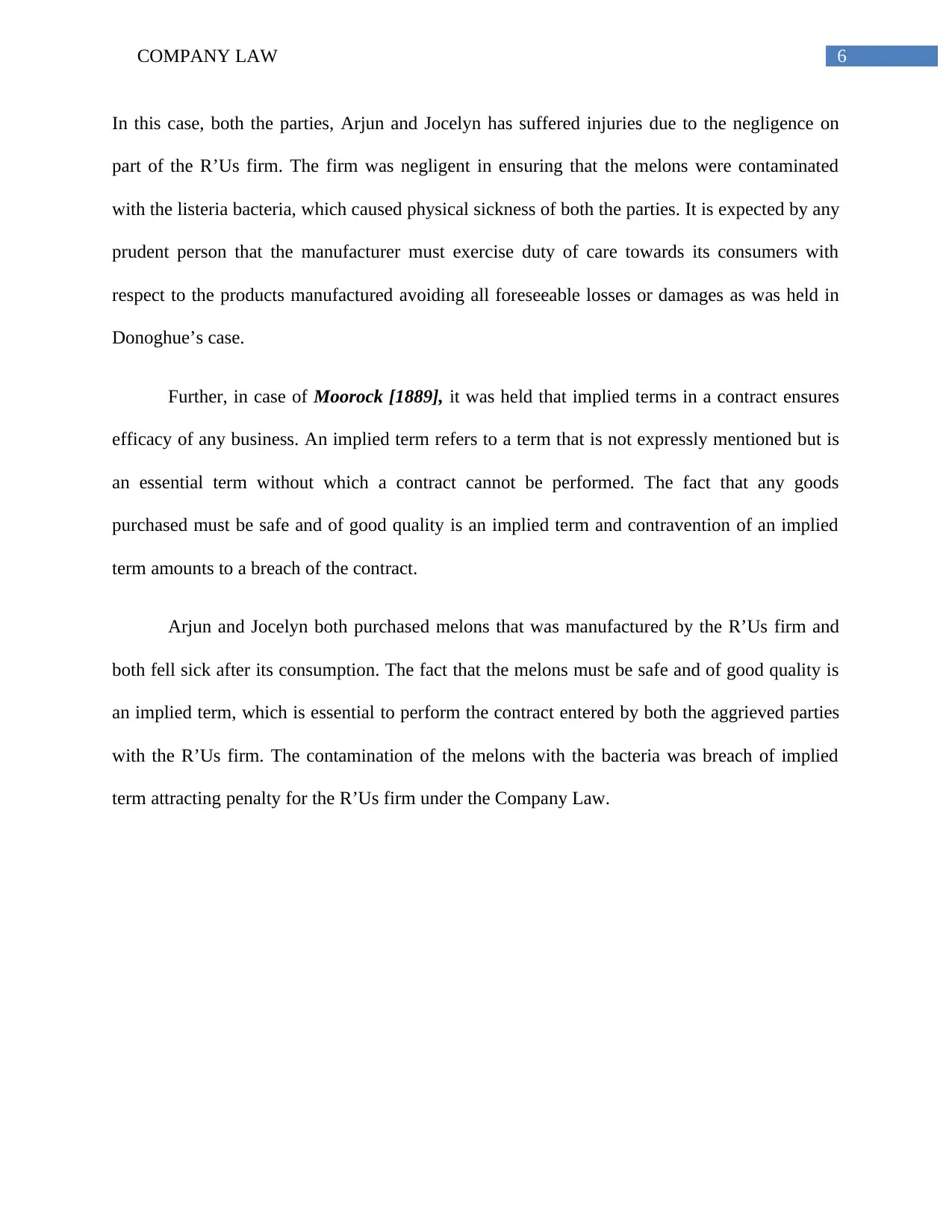
6COMPANY LAW
In this case, both the parties, Arjun and Jocelyn has suffered injuries due to the negligence on
part of the R’Us firm. The firm was negligent in ensuring that the melons were contaminated
with the listeria bacteria, which caused physical sickness of both the parties. It is expected by any
prudent person that the manufacturer must exercise duty of care towards its consumers with
respect to the products manufactured avoiding all foreseeable losses or damages as was held in
Donoghue’s case.
Further, in case of Moorock [1889], it was held that implied terms in a contract ensures
efficacy of any business. An implied term refers to a term that is not expressly mentioned but is
an essential term without which a contract cannot be performed. The fact that any goods
purchased must be safe and of good quality is an implied term and contravention of an implied
term amounts to a breach of the contract.
Arjun and Jocelyn both purchased melons that was manufactured by the R’Us firm and
both fell sick after its consumption. The fact that the melons must be safe and of good quality is
an implied term, which is essential to perform the contract entered by both the aggrieved parties
with the R’Us firm. The contamination of the melons with the bacteria was breach of implied
term attracting penalty for the R’Us firm under the Company Law.
In this case, both the parties, Arjun and Jocelyn has suffered injuries due to the negligence on
part of the R’Us firm. The firm was negligent in ensuring that the melons were contaminated
with the listeria bacteria, which caused physical sickness of both the parties. It is expected by any
prudent person that the manufacturer must exercise duty of care towards its consumers with
respect to the products manufactured avoiding all foreseeable losses or damages as was held in
Donoghue’s case.
Further, in case of Moorock [1889], it was held that implied terms in a contract ensures
efficacy of any business. An implied term refers to a term that is not expressly mentioned but is
an essential term without which a contract cannot be performed. The fact that any goods
purchased must be safe and of good quality is an implied term and contravention of an implied
term amounts to a breach of the contract.
Arjun and Jocelyn both purchased melons that was manufactured by the R’Us firm and
both fell sick after its consumption. The fact that the melons must be safe and of good quality is
an implied term, which is essential to perform the contract entered by both the aggrieved parties
with the R’Us firm. The contamination of the melons with the bacteria was breach of implied
term attracting penalty for the R’Us firm under the Company Law.
Paraphrase This Document
Need a fresh take? Get an instant paraphrase of this document with our AI Paraphraser
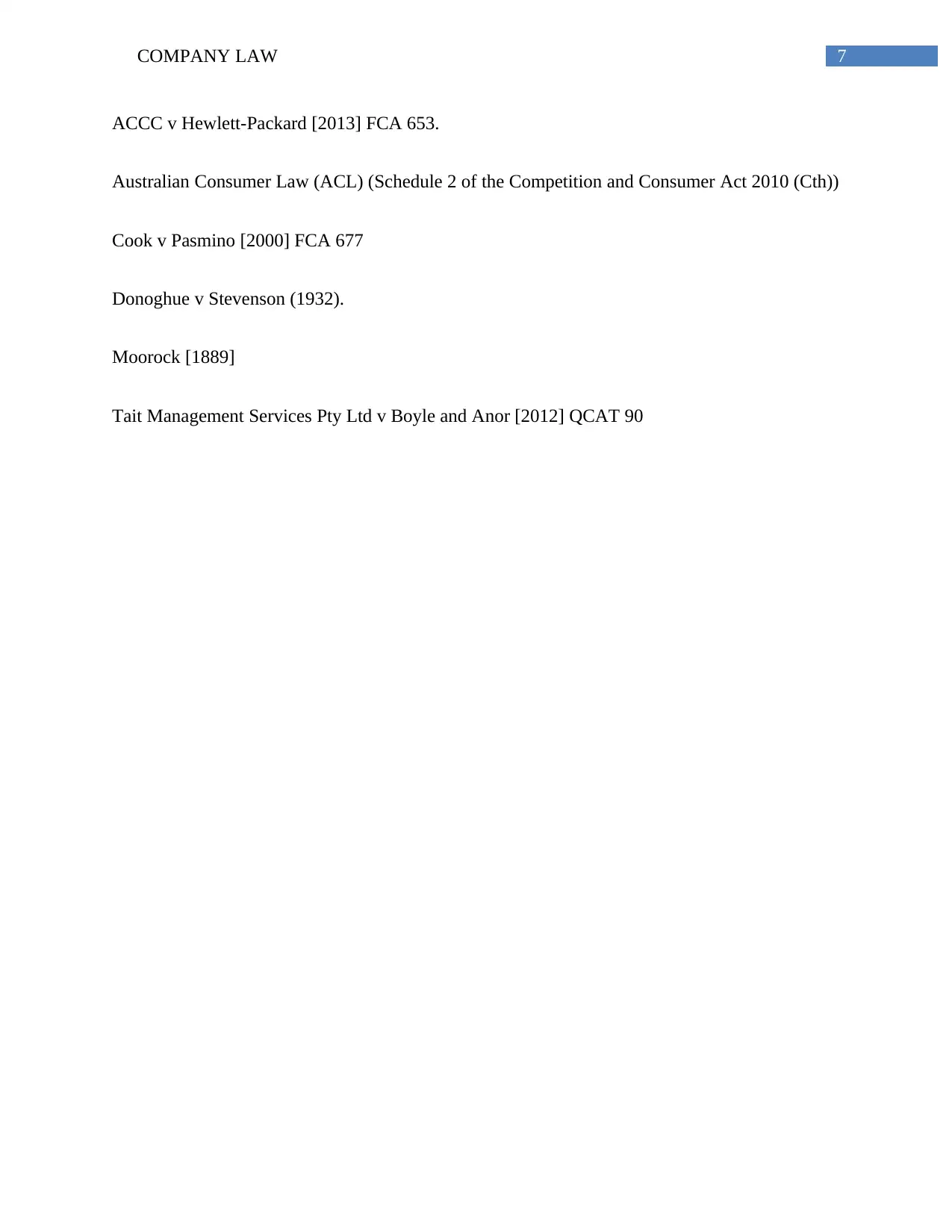
7COMPANY LAW
ACCC v Hewlett-Packard [2013] FCA 653.
Australian Consumer Law (ACL) (Schedule 2 of the Competition and Consumer Act 2010 (Cth))
Cook v Pasmino [2000] FCA 677
Donoghue v Stevenson (1932).
Moorock [1889]
Tait Management Services Pty Ltd v Boyle and Anor [2012] QCAT 90
ACCC v Hewlett-Packard [2013] FCA 653.
Australian Consumer Law (ACL) (Schedule 2 of the Competition and Consumer Act 2010 (Cth))
Cook v Pasmino [2000] FCA 677
Donoghue v Stevenson (1932).
Moorock [1889]
Tait Management Services Pty Ltd v Boyle and Anor [2012] QCAT 90
1 out of 8